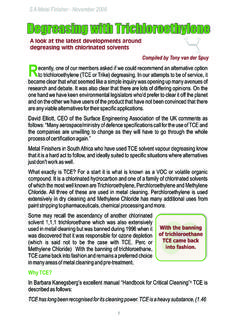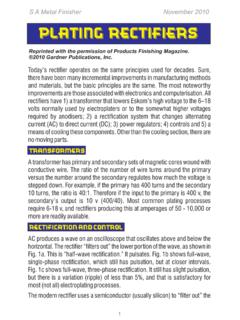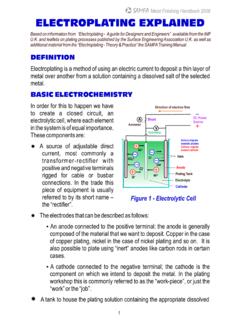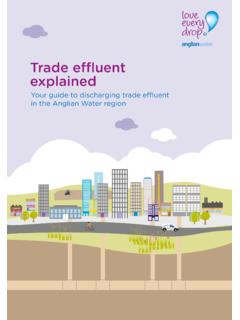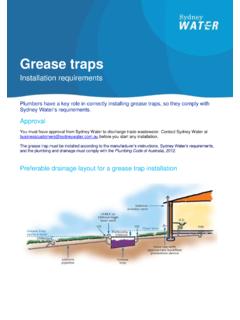Transcription of CITY OF CAPE TOWN - SAMFA Home Page
1 1 city OF cape town wastewater AND industrial EFFLUENT BYLAW CONTENTS 1. DEFINITIONS Page 2 CHAPTER 1 DUTIES AND PROHIBITED ACTS 4 2. Duties of owners of property 4 3. Protection of municipal sewers 4 4. Clearing of blocked private sewers 6 CHAPTER 2 industrial EFFLUENT 6 5 Consent required to discharge industrial effluent 6 6.
2 Non-waterborne disposal of industrial effluent 6 7. Charges in respect of industrial effluent 7 CHAPTER 3 REPEAL AND PENALTIES 7 8. Repeal of by-laws 7 9 Offences and penalties 7 SCHEDULE 1 - CHARGES AND QUANTITY OF industrial EFFLUENT 7 1. Charges in respect of industrial effluent 7 2.
3 Calculation of quantity of industrial effluent discharged 8 SCHEDULE 2 - PROHIBITED DISCHARGE INTO SEWERS 10 SCHEDULE 3 REPEAL OF BY-LAWS 11 2 wastewater AND industrial EFFLUENT BY-LAW 1. Definitions In this by-law:- council means the council of the municipality of cape town and includes any structure, councillor, or official of the council exercising powers or performing duties or functions under this by-law, which have been delegated to such structure, councillor or official by the council; industrial effluent means any liquid whether or not containing matter in solution or suspension, which is given off in the course of or as a result of any industrial trade, manufacturing, mining or chemical process or any laboratory, research, service, or agricultural activity, and includes matter discharged from a waste grinder.
4 Municipal sewer means any pipe or conduit under the control of the council which may be used for the conveyance of wastewater ; occupier means a person who occupies any premises or part thereof, without regard to the title under which he or she occupies; owner means - (a) the person in whom from time to time is vested the legal title to premises; (b) in a case where the person in whom the legal title to premises is vested is insolvent or dead, or is under any form of legal disability whatsoever, the person in whom the administration and control of such premises is vested as curator, trustee, executor, administrator, judicial manager, liquidator or other legal representative; (c) in any case where the council is unable to determine the identity of such person, a person who is entitled to the benefit of the use of such premises or a building or buildings thereon; (d) in the case of premises for which a lease agreement of 30 years or longer has been entered into, the lessee thereof.
5 (e) the person who has purchased immovable property from the municipality, in terms of a scheme that allows for the purchase price to be paid in installments and who has not received transfer from municipality; (f) in relation to - (i) a piece of land delineated on a sectional plan registered in terms of the Sectional Titles Act, 1986 (Act 95 of 1986), the developer or the body corporate in respect of the common property, or (ii) a section as defined in such Act, the person in whose name such section is registered under a sectional title deed; and includes the lawfully appointed agent of such a person; 3 person includes a juristic person; stormwater means water resulting from natural precipitation and/or the accumulation thereof and includes groundwater and spring water ordinarily conveyed by the stormwater system, as well as sea water within estuaries, but excludes water in a drinking water or wastewater reticulation system; waste grinder means any mechanically operated device which grinds and flushes matter into the wastewater system or removes from vegetables or other foodstuffs, peels, skins, scales or other matter for discharge directly or indirectly into the wastewater system, and includes effluent from a food waste grinder.
6 wastewater means any liquid waste, whether or not containing matter in solution or suspension, and includes domestic liquid waste and industrial effluent but excludes stormwater, wastewater system means the structures, sewers, pipes, valves, pumps, meters or other appurtenances under the control of the council, which may be used for the conveyance or disposal of wastewater . CHAPTER 1 4 DUTIES AND PROHIBITED ACTS 2. Duties of owners of property (1) Every owner of property shall on receipt of written notice by the Council-- (a) construct a private sewer installation on the premises; (b) connect a private sewer installation to the municipal sewer, whether directly or indirectly as required by the council; (c) enlarge the capacity of a private sewer installation to accommodate a greater discharge, or (d) reconstruct a private sewer installation to comply with the requirements of the council; (e) submit and implement a waste management plan including inter alia a waste minimisation schedule.
7 (f) submit and implement a chemical management plan including inter alia an inventory. (2) No owner of property may allow - (a) the ingress of groundwater or stormwater into a private sewer installation on his or her premises, or (b) the seepage of wastewater from a private sewer installation on his or her premises, or (c) the ingress of stormwater into a private sewer installation on his or her premises, except with the written consent of the Council and subject to such conditions as it may impose. (3) Every owner of property shall take adequate measures to prevent ingress and seepage referred to in subsection (2). 3. Protection of municipal sewers (1) No person shall, except with the written consent of the council and subject to such conditions as it may impose - (a) construct, erect or lay any building, structure or other thing over or in such a position or in such a manner as to interfere with or endanger any municipal sewer; (b) excavate, open up or remove the ground above, next to, under or near any municipal sewer; (c) damage, endanger or destroy or do any act likely to damage, endanger or destroy any municipal sewer.
8 (d) make any opening in any municipal sewer, or abstract, divert or cause to be abstracted or diverted any sewage therefrom; (e) discharge, permit to enter or put into any municipal sewer-- (i) any stormwater; (ii) any gas or steam; (iii) any liquid (not being domestic wastewater ) with a temperature higher than 40 C; (iv) any petrol, oil, greases, waxes, fat or pesticides, insecticides or paints; (v) any refuse or waste resulting from any industrial , trade, manufacturing or 5 chemical process; (vi) any liquid which has a pH value of less than five comma five or greater than twelve; (vii) any substance which gives off or is liable to give off explosive, poisonous or inflammable gases or vapours; (viii) any substance which has an Abel's open cup flashpoint of less than 60 C; (ix) any substance which contains volatile flammable solvents or solvents immiscible with water; (x) any substance which may, in the opinion of the council, by itself or in combination with any other substances:- (aa) cause a nuisance to any person; (bb) endanger the health of or injure any person: (cc) interfere with the free flow of sewage.
9 (dd) injuriously affect any sewer or wastewater works or land connected with any sewer or with the conveyance, treatment, purification, disposal or re-use of wastewater , or (ee) in any way prejudice the disposal or re-use of wastewater effluent after treatment or purification or lead to an effluent which does not meet the requirements imposed in terms of any applicable legislation; (f) discharge any substance other than industrial effluent into a separate private system of conveyance, and (g) in cases where a separate private system of conveyance for industrial effluent is installed, discharge industrial effluent into any other sewer. (2) The council may order that the person or persons responsible-- (a) demolish, alter or otherwise deal with any building, structure or other thing constructed, erected or laid in contravention of this section; (b) fill in and make good any ground excavated or removed in contravention of this section; (c) repair and make good any damage done in contravention of this section or resulting from a contravention of this section.
10 (d) remove anything discharged, permitted to enter or put into a sewer or public drain in contravention of this section, and (e) remove anything damaging, obstructing or endangering or likely to damage, obstruct, endanger or destroy any municipal sewer. (3) If a person fails to comply with an order issued in terms of subsection (2), the Council may take such steps as it may deem necessary to rectify the matter at the cost of the person responsible. (4) The council shall, at the cost of the owner, disconnect from the municipal sewer system any private sewer installation which, in the opinion of the council, in any way endangers or injuriously affects or may endanger or
